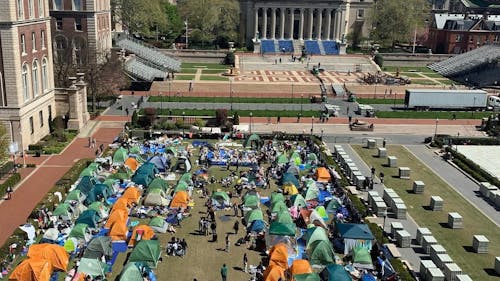ABD-ELHAMEED: Neither academic institutions nor diverse representation guarantee liberation

Dozens of Columbia University students took part in the Gaza Solidarity Encampment starting Wednesday early morning, a form of protest that consists of occupying campus lawns until the university divests from Israeli companies profiting off apartheid.
The following morning, 108 of these peaceful protestors were arrested, along with three students who received suspensions and evictions from the university.
The face who perpetrated this arguably fascist and despicable act of mass arresting her students is Nemat (Minouche) Shafik. Shafik is an Egyptian Muslim woman and Columbia's first Arab and woman president.
And her identity means nothing to the representation and protection of Arab and Muslim students.
Shafik swiftly sent a university-wide email to Columbia's students Thursday afternoon, claiming that the encampment "severely" disrupted "campus life" while creating "a harassing and intimidating environment" for many of the university's students.
She said this all the while claiming to champion "free speech" and acting as if unleashing the New York Police Department (NYPD) would dissipate the so-called "intimidating" environment on campus caused by students simply staying in tents on a designated campus lawn.
Meanwhile, her authorization to arrest these students was the sole contributor to a violent and harmful environment.
Knowing that these demands were carried out by an Egyptian Muslim woman and immigrant is deplorable, to say the least, but also fully exposes the reality that representation does not equate to nor guarantee liberation.
I remember learning of Shafik's inauguration as president and feeling proud to discover that she was an Egyptian Muslim woman like me, inevitably assuming that this representation in her position would facilitate beneficial contributions toward Columbia's academia and atmosphere.
I, like many others, played into the notion of identity politics, presuming that Shafik's leadership had to hold some significance for the Arab and Muslim students.
We took her race, religion and gender for granted while neglecting her class, completely undermining that being a part of the ruling class can, and most times will, trump the weight of the individuals sharing the race and religion of those marginalized.
And Shafik did not act alone in these mass arrests.
Eric Adams and Edward Caban as the current Black mayor of New York City and the first Latino commissioner of the NYPD, respectively, should receive credit for these mass arrests along with Shafik.
At the United Nations, Linda Thomas-Greenfield and Robert Wood, both Black, are two of the four ambassadors of the U.S.
It is consistently Greenfield or Wood representing the U.S. at Security Council meetings and abusing the veto power on resolutions about Israeli and Palestinian disputes.
It is as if non-white ambassadors in the U.S. provide cover for its alleged war crimes, attempting to forge a post-racial facade where the Zionist agenda is not imperialist and white supremacist at its roots.
Once again, simply getting a seat at the table is not enough and will not constitute the protection of those voices that need it.
At the same time, that representation will not guarantee the liberation of the oppressed. Shafik's behavior is part of the phenomenon that renowned academic institutions claiming to bear exceptionally high standards of education are laughably hypocritical.
Columbia is one of eight American universities that hold the "Ivy League" title, a prestigious distinction known in the U.S. and internationally.
Students are expected to immerse themselves in an exclusive academic community where they have the privilege of obtaining a supposed top-quality education from intellectually renowned faculty.
Yet these same students are barred from using their education beyond the classroom to resist the ruling class.
To provide a specific example of this hypocrisy at play, Asna Tabassum is the valedictorian of her class at the University of Southern California (USC).
Due to her valedictorian status, she was invited to speak at the university's commencement ceremony, but her invitation was rescinded less than two weeks later.
Tabassum is a first-generation, South Asian-American Muslim who is vocal on fighting for Palestinian liberation.
What is incredulously ironic is that her completed minor is "Resistance to Genocide."
In an interview with CBS Mornings, she eloquently exposed USC's hypocrisy: "I used what I learned from USC to inform my worldviews, and when I speak on it, I'm penalized for it by the very people who offered me that dream."
What becomes of a college degree or of academic integrity if these institutions allow for the complicity of endless mass casualty of civilians?
Academic institutions want you to keep your head in the books so that you are paralyzed into immobilization.
When students deliberately take their education from the books to the streets to resist those same oppressive hierarchies that they have studied and written about, the ruling class will deem any efforts of collective action toward liberation futile and a mere disruption to society's hegemonic powers.
What does the title of "Ivy League" become when there is no legitimate encouragement to use their given education beyond writing a research paper?
Liberation relies on the mobilization of the masses. It relies on building connections and coalitions and collective action, not solely from diverse representation of political power or from obtaining a degree from a "prestigious" university.
Liberation stems from struggle. From resistance.
Naaima Abd-Elhameed is a senior in the School of Arts and Sciences majoring in journalism and media studies and minoring in Arabic and international and global studies. Her column, "Something to Think About," runs on alternate Tuesdays.
*Columns, cartoons, letters and commentaries do not necessarily reflect the views of the Targum Publishing Company or its staff.
YOUR VOICE | The Daily Targum welcomes submissions from all readers. Letters to the editor must be between 350 and 600 words. Commentaries must be between 600 and 900 words. All authors must include their name, phone number, class year and college affiliation or department to be considered for publication. Please submit via email to oped@dailytargum.com and eic@dailytargum.com to be considered for publication.



